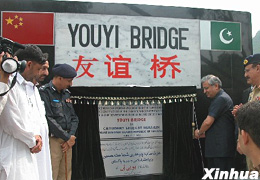|
|||||||||||||
|
|
||||||||||||
|
Thursday, August 19, 2004The Chinese Dilemma [EN]No matter what, I love the Chinese. I like their reflective art of living and their almost allergic repugnance to oxymoron when reasoning.
So, here you have a Chinese view on terrorism and terrorists that, someway, somehow, illustrates China’s peculiar dilemma in the NetWar. Now, go ahead, think Chinese and wonder: what is China’s dilemma? This one is particularly useful to Europeans who have had their perception, well, managed… Now, read this pearl of the official Xinhua agency and let your imagination fly into the near future. Did you know that there were 22 Chinese citizens locked up in Guantanamo? Come on, did you know it? When is a terrorist not a terrorist? www.chinaview.cn 2004-08-19 09:01:57  BEIJING, Aug. 19 (Xinhuanet) -- The US decision not to return the detained Chinese "East Turkistan" terrorists to China has sent out a wrong signal. US Secretary of State Colin Powell said last week the US has decided not to hand back the 22 Chinese Uygur terrorists currently held at Guantanamo Bay in Cuba. He said the US will find a new destination for them.  Powell acknowledged that finding "new places" was not a simple matter. Powell acknowledged that finding "new places" was not a simple matter.
Maybe the US secretary of state knew deep down that to relocate these Chinese suspects elsewhere beyond China is legally and morally ungrounded. Undoubtedly, it is China, not other countries, that should bring to justice the Chinese "East Turkistan" forces, which made up part of the pervasive international terrorist network. The "East Turkistan" forces are listed as terrorist by the UN Security Council and the United States. They have plotted more than 260 attacks inside Northwestern China's Xinjiang Uygur Autonomous Region, killing 162 and wounding 440 to date. Moreover, a mountain of evidences suggest the group has close links with al-Qaida, Taliban remnants, Chechen terrorist groups and other international terrorist cliques. According to China's counter-terrorism agency, from February 2001 to September 2002, the president of the East Turkistan Information Centre (ETIC), Abudujelili Kalakash, trained its members in Xinjiang for terrorist activities. In March 2003, Kalakash directed a field survey along the railway between Lanzhou in Gansu Province and Hami in Xinjiang in preparation for blowing up the line - one of many planned attacks. The United States has been seriously concerned and remains on high alert, fearing terrorist activities against US targets both on home soil and abroad. The US President George W. Bush once warned the world that they were either on the side of the United States or on the side of terrorists, following the attacks on September 11, 2001.  But when deciding not to send Chinese terrorists back to China, which side does the United States choose to be on? But when deciding not to send Chinese terrorists back to China, which side does the United States choose to be on?
Showing leniency to terrorists surely means non-leniency to innocents. Undoubtedly, the US decision serves as a short-sighted move that will benefit none but the terrorists. Possibly, Washington has a different classification on those who prefer to act secretly as they threaten the world with terror and fear. Is it, then, only those threatening US interests who are considered as real terrorists?
|
| ||||||||||||||||||||||||||





